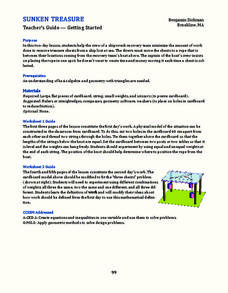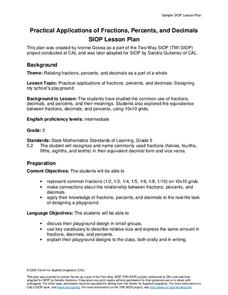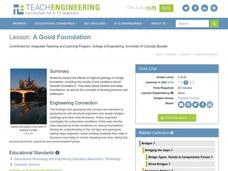Curated OER
Sunken Treasure
You've located buried treasure, now what? Explore how to use algebraic and geometric methods to determine where to place a recovery ship based on the location of the treasure.
Teach Engineering
Matching the Motion
It is not always easy to walk the straight and narrow. In the sixth portion of a nine-part unit, groups actively recreate a graph depicting motion. Individuals walk toward or away from a motion detector while trying to match a given...
Teach Engineering
Designing a Spectroscopy Mission
In this mind-bending activity, young engineers explore this question of whether or not light actually bends. Using holographic diffraction gratings, groups design and build a spectrograph. The groups then move on research a problem...
Center for Applied Linguistics
Practical Applications of Fractions, Percents, and Decimals
Young architects are prompted to design a playground in assigned groups. Using a 10 x 10 grid. Your fifth graders will apply their knowledge of fractions, percents, and decimals to the real-world task of designing a playground. Students...
Teach Engineering
A Good Foundation
It takes a strong foundation to build a house and a stronger one for a bridge. This resource presents the effects of geology and soil on bridge foundations. Working in groups, the class investigates the interaction of shallow and deep...
Virginia Department of Education
Properties of Quadrilaterals
What type of quadrilateral is that? Discover the difference between the types of quadrilaterals. Small groups investigate types of quadrilaterals using geometry software to find their properties. To keep track of the different...
Curated OER
Two for One Box Company: Student Worksheet
Fifth and sixth graders work alone or in pairs to determine the volume of paper boxes of various dimensions. Pupils write ratios of dimensions and volumes.
Scholastic
Eric Carle Author Study
Learn all about Eric Carle, find out about his famous caterpillar, and try out related art, science, writing, math, and social studies activities. The resource comes with plenty of materials to support your instruction.
Scholastic
Study Jams! Function Tables
Each week Mia saves a certain portion of the earnings from her babysitting job. Help her figure out how much she can save this week with a step-by-step presentation on function tables. Given a set of inputs and outputs, the process for...
Curated OER
Chain Connection and Un-Connection Activity
Learners practice remaining on topic during a conversation using printouts of chains as visual models for their work. Chains are placed in sequence while students stay on a shared topic of conversation, and a broken chain is used as a...
Rainforest Alliance
Investments in Forest Carbon
One hundred metric tons of CO2 can accumulate in one acre of forest over time—that's a lot of carbon! In the activity, groups of middle school learners determine what makes forests important. They then solidify the concept by using a...
Kenan Fellows
Isotopic Pennies
Many people confuse atomic mass and atomic numbers. The sixth of seven lessons in a unit requires scholars to find the weight of different groups of pennies. Then, they must solve how many of each type of penny exists in a closed system...
Yummy Math
US Holiday Candy Sales
Candy is a big business! Calculate the amount of money consumers spent on major holidays—Easter, Halloween, Christmas, Hanukkah, and Valentine's Day—based on the total amount of candy sales from 2011 and the percentage of each holiday's...
Virginia Department of Education
Surface Area and Volume
Partners use materials to wrap three-dimensional objects to determine the formula for surface area. The groups use an orange to calculate the amount of peel it takes to completely cover the fruit. Using manipulatives, individuals then...
Big Learning
The Antarctica Project: A Middle School Mathematics Unit
Antarctica is a big place, large enough to provide ample opportunities to learn about math. A two-week unit teaches middle school mathematics concepts using project-based learning. The resource covers functions, geometry (area,...
EngageNY
Advanced Factoring Strategies for Quadratic Expressions (part 2)
What do you do with a difficult-to-factor quadratic expression? This activity provides the answer. Pupils learn a grouping strategy to help factor trinomials. When guess and check seems too tedious, this method is the "works every time"...
Math Worksheets Land
Add and Subtract Multi-Digit Whole Numbers
Help young mathematicians see the value in addition and subtraction. Offering one addition and one subtraction problem, this activity walks students step-by-step through the solutions of each, starting in the ones place and working their...
Curated OER
Problem Solving with Multi-Step Number Stories
Pupils solve multi-step number stories. They create number models to solve number stories. Everyone chooses the appropriate operation to use after reading the problem, and then work in small groups to solve.
West Contra Costa Unified School District
Division (No Remainders)
Help young mathematicians build a solid understanding of division with this base ten block activity. With the help of these popular math manipulatives, children model different math problems in order to reinforce the connection between...
EngageNY
Matrix Multiplication Is Distributive and Associative
Learn the ins and outs of matrix multiplication. After discovering the commutative property does not apply to matrix multiplication in a previous lesson in the series, pupils now test the associative and distributive properties. The...
EngageNY
End-of-Module Assessment Task - Algebra 2 (Module 1)
A series of assessment tasks require learners to process information and communicate solutions. Topics include graphing parabolas, solving linear-quadratic systems, factoring polynomials, and solving polynomial equations.
EngageNY
Word Problems Leading to Rational Equations
Show learners how to apply rational equations to the real world. Learners solve problems such as those involving averages and dilution. They write equations to model the situation and then solve them to answer the question — great...
EngageNY
Putting the Law of Cosines and the Law of Sines to Use
Use the Law of Cosines and the Law of Sines to solve problems using the sums of vectors. Pupils work on several different types of real-world problems that can be modeled using triangles with three known measurements. In the process,...
Differentiation Central
Perimeter and Area
Leave no student behind with this differentiated geometry unit on perimeter and area. Over the course of five lessons, young mathematicians explore these foundational concepts through a series of self-selected hands-on activities and...

























